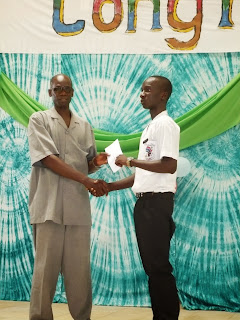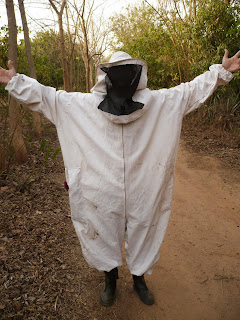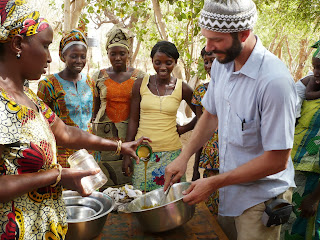One day last week I stopped by the maternity ward after clinic, to greet some nurse and midwife friends before heading home for some rest and some lunch (it was about 12:30). They mentioned that a young woman who was having very difficult labor was in the delivery room. I stopped in and found this 21 year old woman (this was her first pregnancy) in a state of absolute exhaustion, all alone on the bare delivery table, with a few nurse standing around. Her aunties and husband were outside somewhere and she told me (in English) that she had not slept or eaten anything in nearly two days. One of the midwives told me he had just checked and she was fully dilated, so he was hopeful she'd deliver by 2pm.
I decided that if I could give her some support, I should stay. So I stayed. I held her and reassured her and encouraged her while she pushed for 5 hours. There was no option for any kind of pain relief and the best we could do for her exhaustion was to keep some IV fluids running, give her sips of water and have her lick some sugar in attempt to give her a little energy. I was exhausted and hungry, but I know it was nothing compared to what she was going through. At one point everyone else had left the room and she said,
"You are a good person. Everyone else has left me here."
Later she said, "I am going to die."
"You are NOT going to die," I said. "You are very strong. You are going to be fine. Your baby is going to be fine. You are going to do this."
At 5:30 they decided to arrange an ambulance ride to Banjul, because the hospital there could do a cesaerean section. We had her get up and put on a wrap skirt. Her aunty came and tied her headwrap back on.
"Ning sunkuto a bambanta baake," I told the aunty in Mandinka. (This girl is very strong.)
Her legs were too weak to support her, but she wanted to sit on the commode while we waited for the ambulance. I held her while she sat there for about twenty minutes, pushing through countless strong contractions. When one of the midwives came in she got back on the table and pushed the baby out in just a few minutes.
The baby girl was big, obviously full term, with a lot of hair. But she had been stuck in the birth canal for a long time and was limp and grey. Her breathing was slow and irregular and after suctioning her airway the midwife and several Cuban doctors began administering oxygen.
"We need ventilator," one doctor said. "In other country, they have ventilator."
No one said anything to the mother, who was still on the table, getting some painful sutures. I held her hand and told her,
"The baby is not breathing well, but they are trying to help. They are giving oxygen and medicine."
Around 6pm the mother was transferred to the postnatal ward and her aunties brought a foodbowl with fish, rice and sauce. She asked me to eat with her. We sat there, surrounded by a few other moms and their babies, and ate. It was hard for me to swallow. I washed the oil and stray pieces of rice off my right hand and I told her I would go check on the baby.
When I reached the delivery room I saw one of the the Cuban doctors pronouncing the newborn dead.
"I don't hear nothing," he said in broken English, shrugging and putting his stethoscope down.
I went with one of the midwives to break the news to the mother and her family. I stayed with her while she sobbed uncontrollably.
"Take me there," she said finally and I steered her wheelchair down the hallway to the delivery room. Several nurses and the cleaner who was mopping the floor gathered round as she unwrapped the infant and examined her, touching her ears, lips and hair. They began praying and patting the mother's back.
She never got to hold the baby.
 |
| Post-natal ward |







































